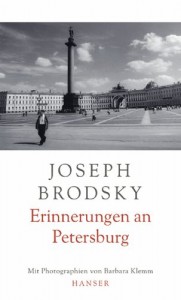LESS THAN ONE/Joseph Brodsky

In 1986, Joseph Brodsky (Nobel prize for literature 1987) describes in two texts (“LESS THAN ONE” und “A ROOM AND A HALF”) his childhood, the Russian collective unconscious, anti-Semitism, and the characteristics of society under totalitarian rule that can make anybody both hangman and victim. Both texts are equally beautiful and painful. The German translators have, as much as I can judge, caught the laconic poesy of the text with extraordinary precision. „Schlampiger Schlamper“, a German expression one can be happy to think of. “Let my dead find shelter in English”– Brodsky’s thought that his decision to write about his parents in English means to posthumously free them from the repressive and soulcrushing Russian context is as beautiful as it is kaputt. It is certainly his grandeur to harvest such wonderful thoughts from the pain his country caused him, from this completely shattered and defiled and abused country and its population – like an alchemist produces gold from dirt. I am tempted to prove it by quoting the small volume in its entirety: the description of the parents’ kommunalka (a shared apartment), the way the author describes the tragedy of being separated from his parents until they die without being able to see them once again. “Only that I was not able to help them in old-age; only that I was not there when they were dying. I don’t say this out of guilt so much as out of the egotistic wish of a child to accompany his parents through all stages of their lives (…).” He thus manages to transcend the tragedy by the strength of his thoughts and to overcome it as a genre and even to profit from it (“The poor people always want everything to be any good.”).
The photographs by Barbara Klemm in this edition, for once really enlightening and illustrating and, particularly due to the many reflections in LESS THAN ONE, a necessary addition. Anglers in front of the Hermitage, three young women in eastern fashion on a bench in a rundown corner of the city that may or may not have been a park, demanding a worthy life nonetheless in all this.
Whoever gave me this booklet also presented me with this author whom I hadn’t known until then. Thank you very much!
Leave a Reply